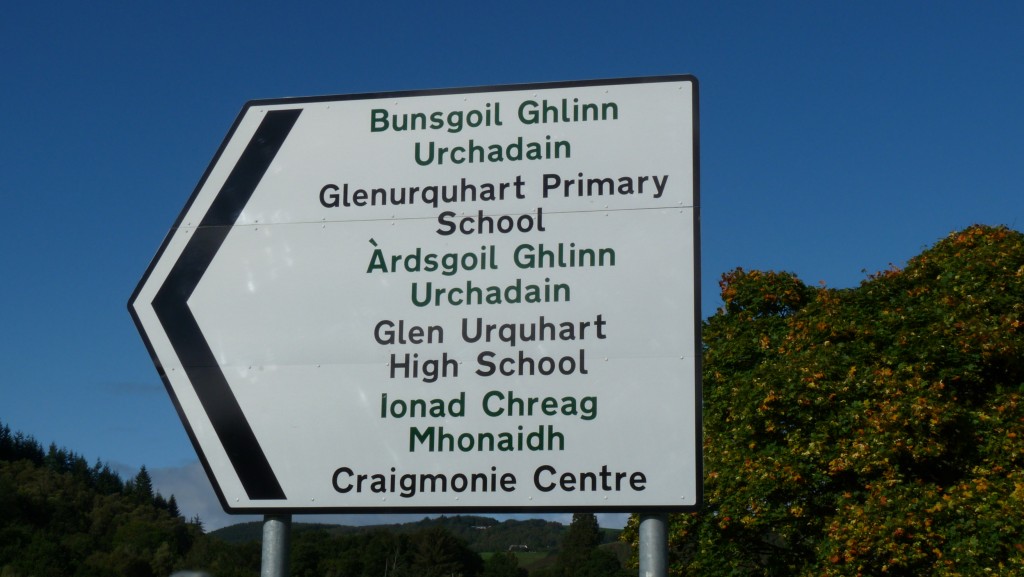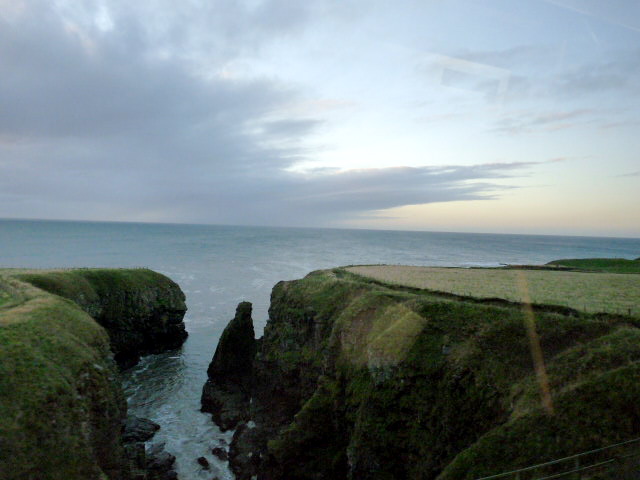It’s 4:45 this morning and the sun remains asleep in Scotland. The sparse streetlamps of the town Inverness quickly fade into the blackness of the highlands as my train careens forward. In order for us to make it home at a reasonable hour, we opted to leave at a unreasonable hour; the nearly nine-hour trip flies when asleep against a train window.
“The next stop is Nairn,” said the overhead. Nairn, what a pretty name, I think. It not only sounds pretty—especially when spoken with a proper Scottish accent—but it’s also aesthetically pleasing. It looks and sounds as if it was stolen from the pages of Lord of the Rings or World of Warcraft. It’s a tall, kingly name.
Inbhir Naraan is the original Celtic name of Nairn. Like most public signs in Scotland, it is listed underneath the official name in a dull yellow color. Even the jumbles of letters like “Bunsgoil Ghlinn” and “Mhonaidh” have seemingly more unpronounceable origins.
The Scots make a big deal out of names—especially family names, which are not merely a form of identification here. Your family name branches backward into the past, intertwining you with roots of human history. All the plaid designs of Scottish wool, called “tartan,” are specifically designated to a particular clan or family. Every gift shop sells garments and trinkets with Scottish family tartans. From Bruce to Lochlan to MacGregor, there’s a specific plaid pattern just for your family.
I think my scarf is a Wallace, I think glancing down towards neck. With a heavy, tired sigh, I gaze into the black highlands landscape.
While faded ghosts of Scottish pine trees whizz pass my window, I have time to contemplate my own name. Schnake is of German origin and its closest translation is somewhere between “gnat” and “mosquito,” though I’m not sure why anyone would choose that name. About four or five generations ago, Heinrich Schnake emigrated from Bavaria in Suden Deutschland to settle in southern Illinois. The strong German heritage seemed to smoothly run through the family tree—at least until my brother and I came along.
See, I don’t look very German. Derek Schnake could as well be a fair-skinned Bavarian fellow playing a tuba in a pair of lederhosen. But, my clay-brown skin and coffee-colored hair invite speculations of anything but German. Mostly, I get some variation of a Latin American country, but every now and then I get Italian, Grecian, or more rarely, Arab. The fact is I don’t match, thanks to my mother’s Filipino heritage. I usually tell people I’m Filipino instead of German because it makes the most sense to people. It matches what they see.
As the sky above the North Sea begins to brighten, I wonder what my mother’s maiden name means: Pangilinan. What does it mean? What is its history? Maybe in Manila, the capitol of the Philippines, they have gift shops with Pangilinan inscribed on an overly priced bottle-opener key chain, much like Scotland. Somehow I doubt it.
The sky has now turned to a turquoise color. Those pine trees now have more manageable silhouettes and I can begin to see the hills in the backdrop. The clouds seem to scatter away from the sun as if afraid.
Here in Highlands—and all the UK, for this matter—family history is something you wear on your sleeve, no matter how meager the origin. For the Scottish people, a name and a tartan tell the family story. For me, I stuff two very different cultures into a space fit for one.
Still, as dawn passes into day outside my window, I’m comforted and thankful. As much as I cherish my family’s history, I don’t revel in it. Unlike many of the ancient grudges alive here in Great Britain, I’m not tied down by my family’s past; I’m free to live for the moment and embrace the future.
I’m liberated by the start of a new day. Thank you, Scotland.


October 3, 2010 at 7:59 am
i need to get to Scotland.